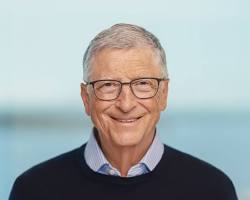
🌟 Bill Gates: A Journey of Innovation and Impact
🧒 Early Life and Passion for Technology
Born on October 28, 1955, in Seattle, Washington, Bill Gates exhibited an early fascination with computers. At the age of 13, he developed his first computer program, a tic-tac-toe game. This passion led him to co-found Microsoft with his childhood friend Paul Allen in 1975.

💻 Founding Microsoft
In 1975, Gates and Allen launched Microsoft, aiming to put a computer on every desk and in every home. Their vision revolutionized the software industry, making personal computing accessible to the masses.

🌍 Philanthropy and Global Impact
In 2000, Gates and his then-wife Melinda established the Bill & Melinda Gates Foundation, focusing on global health, education, and poverty alleviation. The foundation has donated billions to combat diseases like malaria, polio, and HIV/AIDS.

📚 Memoir and Reflections
In 2025, Gates released his memoir, “Source Code: My Beginnings,” offering a candid look into his early life, the founding of Microsoft, and his neurodivergent traits. The book provides insights into his intense focus and the emotional impact of his friend’s death during high school.

💡 Key Takeaways
- Innovation: Gates transformed the software industry, making computing accessible to all.
- Philanthropy: Through his foundation, he has significantly impacted global health and education.
- Resilience: Overcame personal challenges, including the loss of a close friend, to achieve success.
- Vision: Continues to invest in sustainable energy and technological advancement

Inspiring Biography of Bill Gates
🌍 Bill Gates: The Man Who Changed the World Twice
A full inspirational biography with images
🧒 Early Life: A Curious Mind is Born
William Henry Gates III, born on October 28, 1955, in Seattle, Washington, showed signs of brilliance and curiosity from a very young age. The son of William H. Gates Sr., a prominent lawyer, and Mary Maxwell Gates, a businesswoman and educator, Bill was raised in an upper-middle-class family that valued hard work, intelligence, and public service.
From a young age, Bill was an avid reader—plowing through encyclopedias, science fiction novels, and any material he could get his hands on. But it wasn’t just words that fascinated him—it was logic.
At age 13, while attending Lakeside School, a private preparatory school in Seattle, Gates was introduced to a General Electric computer. He wrote his first program—a version of tic-tac-toe—on a teletype terminal. That moment changed his life forever.
“When I was thirteen, my school got a computer… I was hooked.” — Bill Gates

Bill Gates, age 22, in 1977 after a traffic violation — even then, a tech rebel.
💻 Microsoft: Building a Digital Empire
In 1975, Bill Gates dropped out of Harvard University to pursue a business idea with his childhood friend Paul Allen: creating a software company for the emerging personal computer market. They named it Microsoft (short for “Microcomputer Software”).
Their first breakthrough was providing an operating system, MS-DOS, for IBM’s personal computer. The deal was historic. Microsoft retained the rights to license the OS to other PC manufacturers, setting up a software empire.
By 1985, Microsoft launched Windows, a graphical interface for MS-DOS, which eventually became the dominant operating system in the world. This innovation transformed computers from niche technical tools into user-friendly devices for the home and office.

Gates and Allen in 1981 — the minds behind Microsoft’s meteoric rise.
🔑 Key Innovations Under Gates’ Leadership:
- Windows OS (1985–)
- Microsoft Office (1989)
- Internet Explorer (1995)
- Xbox (2001)
By the time Microsoft went public in 1986, Gates was already a multimillionaire. A year later, he became the youngest self-made billionaire in history.
🧠 Leadership Style: Intensity, Focus, and Strategy
Bill Gates was known for his intensity and sharp intellect. He memorized employee license plates to track late arrivals. He challenged every idea in meetings. But he also inspired a culture of excellence, pushing Microsoft to lead in every category.
“I was tough on people. I pushed them hard. I expected results. But I never asked for more than I gave.” — Bill Gates
Some criticized his tactics, especially during the 1998 U.S. v. Microsoft antitrust trial, where the company was accused of monopolistic behavior. But even through controversy, Gates continued to innovate and expand.
💵 Wealth and Power
From 1995 to 2017, Gates was ranked by Forbes as the richest person in the world for 18 of those 23 years. His net worth soared into the hundreds of billions, thanks largely to his Microsoft stock.
📊 Net Worth Over Time (approximate)
| Year | Net Worth (USD) |
|---|---|
| 1986 | $350 million |
| 1987 | $1.25 billion |
| 1995 | $12.9 billion |
| 1999 | $90 billion |
| 2008 | $58 billion |
| 2014 | $76 billion |
| 2020 | $120 billion |
| 2025 | $114 billion |

🌱 Philanthropy: Giving Back to the World
In 2000, Bill and Melinda Gates launched the Bill & Melinda Gates Foundation, now one of the largest private charitable organizations in the world. Its mission: to reduce poverty, improve health care, and expand access to education and technology.

🌍 Areas of Impact:
- Polio eradication
- Malaria vaccine funding
- Sanitation innovations
- COVID-19 research and vaccine distribution
- Girls’ education in developing countries
- Agricultural innovation in Africa
To date, the foundation has donated over $55 billion to global causes.
“With great wealth comes great responsibility.” — Bill Gates
📚 Personal Life & Reflections
Bill Gates married Melinda French in 1994. They had three children and lived a relatively private life in their futuristic mansion in Medina, Washington. In 2021, the couple divorced amicably but continued to work together on their foundation.
In interviews and in his memoir “Source Code: My Beginnings” (2025), Gates has opened up about:
- His autistic traits (intense focus, routine, difficulty with emotions)
- The loss of his childhood friend Kent Evans
- Regrets about Microsoft’s corporate culture
- Hope for the future of AI, climate tech, and global cooperation
🔮 Bill Gates Today: A Legacy Still in Motion
Even in his 70s, Gates shows no signs of slowing down. He now spends most of his time working on:
- Breakthrough Energy Ventures – funding climate change solutions
- AI ethics and governance
- Public health crises through the foundation
- Mentoring young leaders and innovators
He has pledged to give away 99% of his wealth during his lifetime or through his will.

💬 Quotes to Remember
“Success is a lousy teacher. It seduces smart people into thinking they can’t lose.”
“If you are born poor it’s not your mistake, but if you die poor it is your mistake.”
“I choose a lazy person to do a hard job. Because a lazy person will find an easy way to do it.”
“Don’t compare yourself with anyone in this world. If you do so, you are insulting yourself.”
🏁 Final Thoughts: What We Learn from Bill Gates
Bill Gates is more than a billionaire or a tech founder. He is a symbol of possibility—that a curious teenager with a dream can truly reshape the world. Whether you’re inspired by his technology, his wealth, or his giving, Gates’ legacy is undeniable:
- Dream big
- Work relentlessly
- Learn constantly
- And when you’ve succeeded—give back even more

| Year | Estimated Net Worth (USD) | Key Notes |
|---|---|---|
| 1986 | $350 million | Microsoft IPO – Gates becomes a multimillionaire. |
| 1987 | $1.25 billion | Becomes the youngest self-made billionaire at age 31. |
| 1995 | $12.9 billion | Becomes the richest person in the world. |
| 1999 | $90 billion | Peak dot-com bubble wealth. |
| 2008 | $58 billion | Steps down as Microsoft CEO. |
| 2014 | $76 billion | Actively involved in philanthropy; remains one of the richest. |
| 2020 | $120 billion | Pandemic-era growth in tech stock value. |
| 2023 | $106 billion | Drops on rich list due to major charitable giving and stock changes. |
| 2025 (est.) | ~$114 billion | Continues philanthropic work and sustainable investments. |

